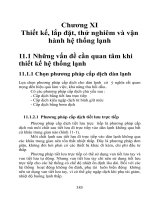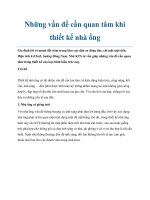những vấn đề mới trong tinh toán thiết kế cầu - báo cáo hội thảo khoa học việt-đức 2006
Bạn đang xem bản rút gọn của tài liệu. Xem và tải ngay bản đầy đủ của tài liệu tại đây (801.01 KB, 9 trang )
VIETNAM-GERMANY SEMINAR
October 17
th
2006
at the University of Transport and Communications (UTC) – Hanoi
PROCEEDINGS SUMMARY
NEW DEVELOPMENTS IN
BRIDGE ANALYSIS AND DESIGN
Hanoi - 2006
Ban tổ chức
TS. Trần Đắc Sử - Hiệu trưởng Trường Đại học GTVT
GS. TS. Nguyễn Viết Trung - Đại học GTVT
PGS. TS. Trần Đức Nhiệm - Đại học GTVT
PGS. TS. Hoàng Hà - Đại học GTVT
TS. Thái Hà Phi - Đại học GTVT
TS. Lê Hải Hà - Đại học GTVT
TS.Nguyễn Duy Tiến - Đại học GTVT
Ban thư ký
Vũ Bích Huệ
Hồ Xuân Nam
Nguyễn Việt Quân
Nguyễn Hữu Thuấn
Chu Văn An
Ngô Văn Minh
Địa chỉ liên hệ
Bộ môn Cầu Hầm – Khoa Công trình
P. 203 – A6 - Đại học GTVT
Láng Thượng - Đống Đa – Hà Nội
Điện thoại: +84-4-7668029
E-mail:
Website:
Organizing Board
Dr. Dac Su Tran - Rector of the UTC
Prof.Dr. Viet Trung Nguyen - UTC
Prof. Dr. Duc Nhiem Tran - UTC
Prof. Dr. Ha Hoang - UTC
Dr. Ha Phi Thai - UTC
Dr. Hai Ha Le - UTC
Dr. –Ing. Duy Tien Nguyen - UTC
Secretariat
Bich Hue Vu
Xuan Nam Ho
Viet Quan Nguyen
Huu Thuan Nguyen
Van An Chu
Van Minh Ngo
Contact Address
Section of Bridge and Tunnel Engineering
Suite 203 – A6 - University of Transport and Communications
Lang Thuong – Dong Da - Hanoi
Tel.: +84-4-7668029
E-mail:
Website:
Lời giới thiệu
Trong những năm qua, kể từ đầu những năm 1990 trở lại đây, lĩnh vực xây dựng cơ
sở hạ tầng GTVT nói chung và xây dựng cầu nói riêng ở Việt Nam đã có những bước phát
triển mới, mạnh mẽ và đạt được những thành tựu quan trọng. Nhiều tiến bộ về khoa học,
kỹ thuật và công nghệ đã được áp dụng, góp phần tạo nên những công trình chất l
ượng,
hiện đại ngang tầm khu vực và quốc tế. Các dạng kết cấu - công nghệ móng sâu, kết cấu
và công nghệ cầu bê tông dự ứng lực nhịp lớn, cầu dây xiên, cầu treo dây võng, cầu
Extradosed, cầu dàn thép thế hệ mới đang ngày càng được áp dụng rộng rãi ở khắp các
vùng miền.
Cùng với việc ứng dụng các kết cấu và công nghệ mới, việc tính toán thiết kế kết cấu
công trình cầ
u cũng có nhiều thay đổi theo hướng hiện đại, hoàn thiện và hội nhập. Bằng
việc nghiên cứu ứng dụng và chính thức ban hành bộ tiêu chuẩn thiết kế cầu mới (22TCN-
272-01 và 22TCN-272-05), những người làm cầu Việt Nam có cơ hội được vận dụng
những thành tựu mới, tiên tiến trong việc nghiên cứu ứng xử của kết cấu cầu dưới tác
dụng các loại tải trọng, các chuẩn m
ực về rủi ro (sự cố) và độ an toàn theo phương pháp
trạng thái giới hạn với các hệ số độ tin cậy riêng - cở sở để xây dựng các bộ tiêu chuẩn
tiên tiến nhất hiện nay như Eurocode (tiêu chuẩn châu Âu), AASHTO LRFD, DIN (tiêu
chuẩn của CHLB Đức), BS5400 (tiêu chuẩn thiết kế cầu của Vương quốc Anh),
Hội thảo khoa học Việt - Đức lần này được tổ chức với sự hỗ trợ
của DAAD (Cơ
quan trao đổi hàn lâm Đức) nhằm tập trung giới thiệu những kết quả nghiên cứu về những
vấn đề liên quan đến tính toán thiết kế cầu theo các tiêu chuẩn thiết kế mới của các nhà
khoa học đến từ các Trường đại học của CHLB Đức, Nhật Bản và các nhà khoa học ở các
Trường đại học, các Viện Khoa học Công nghệ và Hội Khoa học Kỹ thuật Cầu
đường
Việt Nam.
Ban tổ chức xin chân thành cảm ơn các đơn vị và các nhà khoa học đã tham gia và có
bài viết cho Hội thảo khoa học Việt - Đức lần này.
Do hạn chế về thời gian, việc biên tập và in ấn các nội dung bài viết không thể tránh
khỏi những thiếu sót. Mọi góp ý xin gửi về Ban tổ chức hội thảo.
Hà Nội, tháng 10 năm 2006
T/M BAN TỔ CHỨC
PGS. TS. Trần Đức Nhiệm
Đại họ
c Giao thông Vận tải
Foreword
In recent years, especially from the 1990s, the transport infrastructure engineering in
general and bridge engineering in particular in Vietnam have seen new, strong
developments and have attained important achievements. Many advances in science,
engineering and technology have been applied, making contributions to high-quality,
modern works reaching the regional and world class. Such types of structure and
technology as deep foundations, long-span prestressed concrete bridges, cable-stayed
bridges, suspension bridges, Extradosed bridges, steel bridges of modern generation,
are widely applied day by day in all regions of the country.
Along with the application of new structures and technologies, the analysis and design of
bridge structures also have many changes towards modernity, completeness and
integration. Through applied research and the official release of new Bridge Design
Specifications (22TCN-272-01 and 22TCN-272-05), Vietnamese bridge engineers have
the chance to apply new and advanced achievements in studying the behavior of bridge
structures under different loadings with the standards of risk and reliability according to
the Method of Limit States with partial reliability factor - fundamentals for current most
advanced Specifications such as: Eurocode, AASHTO LRFD, DIN, BS5400,
The Vietnam-Germany seminar this time is organized with the support of DAAD
(German Academic Exchange Service) in order to introduce new research results
regarding the analysis and design of bridges according to new Design Specifications, by
scientists from German and Japanese universities, from Vietnamese universities, Institutes
for Science and Technology and Vietnam Bridge & Road Association.
We would like hereby to express sincere thanks to institutions and scientists who have
made valuable contributions to the Vietnam-Germany seminar this time.
Due to lack of time, errors in the editing and printing work of the papers are inevitable,
please feel free to contact the Organizing Board for any suggestion and/or comment.
Hanoi, in October 2006
On behalf of the Organizing Board
Prof. Dr. Duc Nhiem Tran
University of Transport and Communications
Hội thảo khoa học Việt - Đức “Những vấn đề mới trong tính toán thiết kế cầu“ Vietnam - Germany Seminar „New Developments in Bridge Analysis and Design“
1
MẤY VẤN ĐỀ CHUNG KHI THIẾT KẾ THEO
TIÊU CHUẨN THIẾT KẾ CẦU 22TCN-272-05
SOME GENERAL ISSUES IN APPLICATION
OF THE 22 TCN-272-05 BRIDGE DESIGN SPECIFICATIONS
Prof. Dr. Xuan Lam Dao
Vietnam Bridge and Road Association
Abstract: The 22 TCN-272-05 Bridge Design Specifications have been
published for five years. In the process of application there are some
issues on design philosophy need further explain, some general
provisions must be readjusted and the “Open character” of the
Specifications should be comprehensively understood. These are main
contents of the paper.
DESIGN OF CONCRETE BRIDGES
ACCORDING TO EUROCODE AND DIN
- ACTIONS AND SERVICEABILITY LIMIT STATE -
Prof. Dr Ing. Carl-Alexander Graubner
Dr Ing. Holger Schmidt
Dipl Ing. Andreas Greck
Institute for Concrete Structures
Darmstadt University of Technology
Abstract: Concerning the analysis and the design of concrete bridges in
Europe, new standards have to be regarded at national and international
level. The European standard DIN V ENV 1991 with parts 1 and 3 (EC 1
part 1 and part 3) includes regulations regarding the safety concept and
the design of actions on bridges. In addition to DIN V ENV 1992 part 1
(EC 2 part 1), which is already established for building constructions, the
standard DIN V ENV 1992 part 2 (EC 2 part 2) is available concerning
the specifics of bridge constructions. This paper focuses on the actions that
have to be applied on road bridges according to national and international
standards as well as on special checks in the serviceability limit state,
regarding the regulations according to the technical report DIN FB 102.
VỀ CẬP NHẬT MỘT VÀI NỘI DUNG TIÊU CHUẨN
22 TCN-272-05 LIÊN QUAN ĐẾN TÍNH TOÁN
ĐỘNG ĐẤT ĐỐI VỚI CÔNG TRÌNH CẦU
ABOUT UPDATING SOME CONTENTS IN BRIDGE DESIGN SPECIFICATIONS
22 TCN-272-05 CONCERNING THE SEISMIC DESIGN FOR BRIDGES
Prof. Dr. Viet Trung Nguyen
Section of Urban Transport Works
University of Transport and Communications
Abstract: This paper presents some new developments regarding the seismic
design in Vietnam and also brings out suggestions to apply these developments
in updating some contents dealing with the earth-quake design in the Bridge
Design Specifications 22 TCN-272-05
Hội thảo khoa học Việt - Đức “Những vấn đề mới trong tính toán thiết kế cầu“ Vietnam - Germany Seminar „New Developments in Bridge Analysis and Design“
2
MỘT SỐ VẤN ĐỀ TRONG THIẾT KẾ MỐ CẦU THEO
TIÊU CHUẨN THIẾT KẾ CẦU 22 TCN - 272 - 05
ON SOME ISSUES REGARDING SUBSTRUCTURE DESIGN
IN BRIDGE DESIGN SPECIFICATIONS 22 TCN-272-05
Prof. Dr. Minh Nghia Nguyen
MSc. Cam Nhung Nguyen
Section of Bridge and Tunnel Engineering
University of Transport and Communications
Abstract: This paper presents the method of calculating earth pressure
on bridge abutment complying with bridge design specifications from
several countries and 22 TCN-272-05 of Vietnam. The integral
abutments and mechanically stabilized earth (MSE) abutments are also
discussed in terms of detailing, structural analysis and their applications.
PHÂN TÍCH TÍNH NĂNG VÀ ỨNG DỤNG BÊ TÔNG
TÍNH NĂNG CAO VÀO CÁC CẦU LỚN
Ở ĐỒNG BẰNG SÔNG CỬU LONG
PERFORMANCE ANALYSIS AND APPLICATION OF HIGH-PERFORMANCE
CONCRETE IN LONG-SPAN BRIDGES IN MEKONG DELTA
Prof. Dr. Duy Huu Pham
Institute for Science and Technology in Transport Construction
University of Transport and Communications
Abstract: This paper deals with the analysis of compressive strength,
Cloride ion impermeability, financial cost and the structure solutions for
application of high-performance concrete in long-span bridges in
Mekong delta.
CALCULATING TRANSVERSE VIBRATION OF BEAM BRIDGES
UNDER THE ACTION OF SOME MOVING BODIES IN VIETNAM
Prof. Dr. Van Khang Nguyen
Minh Phuong Nguyen
Hanoi University of Technology
Prof. Dr. Ha Hoang
University of Transport and Communications
Abstract: In the present paper the method of substructures is used to derive
transverse vibration equations of continuous beam on intermediate hard and
elastic supports under the action of moving bodies. An algorithm for
calculating the solutions of vibration equations of continuous beam is
represented. From this algorithm, a computer program is created using C
++
language. This computer program has been used in order to calculate
transverse vibration of some beam bridges, which are built in Vietnam.
DESIGN OF CONCRETE BRIDGES IN ULTIMATE LIMIT STATE
ACCORDING TO DIN-SPECIFICATIONS
Prof. Dr. –Ing. habil. Nguyen Viet Tue
MEng. Duc Tung Nguyen
Institute for Structural Concrete and Building Materials
University of Leipzig
Abstract: For the design of structure, a set of performance criteria and stability
that must be met when the structure is in ultimate limit state. If the ultimate
limit state is reached, the structure will fail. This can be caused by loss of
global equilibrium, by reaching critical strain conditions at the most stressed
cross section, by failure of stability as well as fatigue of the materials. In this
paper we present briefly an overview of the calculation models in ultimate
limit state adopted by DIN-Specifications for design of bridges in Germany.
Hội thảo khoa học Việt - Đức “Những vấn đề mới trong tính toán thiết kế cầu“ Vietnam - Germany Seminar „New Developments in Bridge Analysis and Design“
3
PHÂN TÍCH MÔ HÌNH BÀI TOÁN ĐIỀU CHỈNH
NỘI LỰC TRONG CẦU TREO DÂY VĂNG
ANALYSING MODEL OF INTERNAL FORCE ADJUSTMENT
IN CABLE-STAYED BRIDGE
Prof. Dr. Dac Chinh Le
MSc. Trong Nghia Nguyen
Section of Informatics in Civil Engineering
University of Transport and Communications
Abstract: This article concentrates on analysing model of internal force
adjustment in cable-stayed bridge, which is constructed by free cantilever
method (FCM). An illustration proceduced by using RM2000 program is
also given.
NGHIÊN CỨU TĂNG CƯỜNG KHẢ NĂNG CHỊU LỰC CỦA
CẦU BÊ TÔNG DỰ ỨNG LỰC KHU VỰC ĐỒNG BẰNG SÔNG
CỬU LONG BẰNG PHƯƠNG PHÁP DỰ ỨNG LỰC NGOÀI
RESEARCH ON STRENGTHENING OF THE RESISTANT CAPABILITY OF
PRESTRESSED CONCRETE BRIDGES IN CUULONG RIVER DELTA
BY EXTERNAL PRESTRESSING METHOD
Dr. Ngoc Long Nguyen
MSc. The Truyen Tran
Eng. Van Hau Nguyen
Section of Bridge and Tunnel Engineering
University of Transport and Communications
Abstract: This paper presents the situation of prestress concrete bridges
being exploited in Cuu long river delta region, mesures to strengthen
resistant capability by solution of using external prestressing method,
corresponding computing models, some applications in practice with a
number of bridges in 60 national highway in Bentre province. Learning
conclusions about the feasibility of the application of external prestress method
to strenthen the resistant capability of the entire system of prestress bridges in
this region, the proposed petitions to deploy this application with the best
efficiency.
XỬ LÝ CẤU TẠO TRỤ CẦU BẰNG PHƯƠNG PHÁP
SƠ ĐỒ HỆ THANH
DETAILING BRIDGE PIERS USING STRUT-AND-TIE MODELS
Dr. -Ing. Duc Thanh Nguyen
Eng. Viet Hai Do
Faculty of Bridge and Road Engineering
Danang University of Technology
Abstract: The paper shows some main results of a research on working
behaviour of some reinforced concrete piers and application of strut-and-tie
models for their design. An example on detailing piers of the Thuan Phuoc
approach bridge done according to the specifications 22TCN -272-05 is given
to illustrate this new design method.
Hội thảo khoa học Việt - Đức “Những vấn đề mới trong tính toán thiết kế cầu“ Vietnam - Germany Seminar „New Developments in Bridge Analysis and Design“
4
MODELING AND ANALYSIS OF THUAN-PHUOC SUSPENSION
BRIDGE IN CONSTRUCTION STAGES USING MIDAS/CIVIL
Dr Ing. Dang Quang
Ngo
Section of Structural
Engineering
University of Transport and
Communications
Dr Ing. Duc Thanh
Nguyen
Faculty of Bridge and
Road Engineering
Danang University of
Technology
MEng. Ngoc Linh
Tran
Section of Informatics in
Civil Engineering
University of Transport
and Communications
Abstract: In the family of bridge structures, suspension bridges can be
distinguished by their ability to overcome large spans. They are also one
of the most beautiful bridge structure types. However, because of their
structural characteristics, the analysis of suspension bridges, especially in
the construction stages, is always a big challenge for the engineers. This
paper outlines some characteristics in the modeling and analysis of
suspension bridge structure in the construction stage. It also gives an
overview of theories and software applying for analysis of suspension
bridge structure in practice. As an example, the paper presents the
analysis process of Thuan-Phuoc suspension bridge, the currently biggest
suspension bridge in Vietnam using the program MIDAS/Civil.
VỀ BỀ RỘNG CÓ HIỆU CỦA BẢN BÊTÔNG TRONG
CẦU DẦM LIÊN HỢP THÉP – BÊTÔNG CỐT THÉP
TRONG MỘT SỐ TIÊU CHUẨN THIẾT KẾ HIỆN HÀNH
PROVISION OF EFFECTIVE FLANGE WIDTH FOR STEEL-CONCRETE COMPOSITE
BRIDGE BEAMS IN CURRENT DESIGN SPECIFICATIONS
Prof. Dr. Duc Nhiem Tran
Eng. Manh Hai Nguyen
Section of Bridge and Tunnel Engineering
University of Transport and Communications
Abstract: In the analysis and design of steel-concrete composite girders of a
bridge, deflections, stresses, and strengths are typically obtained from
elementary beam bending theory by utilizing the effective flange width
concept. Besides the exact numerical valuas that can be given by numerical
analysis of a bridge, it is necessary that code provisions should provide
simplified practical method of evaluation of effective flange width without
significant loss of accuracy. So each code implements different ideas and
approaches for specifying effective flange width. Comparing them highlights
distinct philosophies underlying the various effective width code formulations,
which is the main objective of this paper. In this paper, the effective flange
width provisions in the Vietnam, US, Britain, Canada, Japan and European
Committee are presented and compared. Characteristics of each provision are
briefly described and summarized. Numerical comparisions for simply-
supported spans and negative moment regions of continuous spans follow.
Hội thảo khoa học Việt - Đức “Những vấn đề mới trong tính toán thiết kế cầu“ Vietnam - Germany Seminar „New Developments in Bridge Analysis and Design“
5
TỔNG QUAN VỀ CÁC ĐẶC ĐIỂM CỦA CẦU EXTRADOSED
GENERAL CHARACTERISTICS OF EXTRADOSED BRIDGES
Dr. –Ing. Duy Tien Nguyen
Eng. Viet Quan Nguyen
Section of Bridge and Tunnel Engineering
University of Transport and Communications
Abstract: Extradosed bridge has a relatively short history of
development as compared with other modern long-span bridges like arch
bridge, cable-stayed or suspension bridges. However this type of bridge
has been developed and introduced in many countries in the world, from
Europe, Japan, the United States to many Asian countries and Vietnam.
Especially in Japan Extradosed bridge has been researched and
developed for many types of structure and materials. This report
summarizes the history of development of Extradosed bridge in the
world, basic features and study results of some structural parameters. It is
the hope of the authors that Extradosed bridge be further researched and
developed in Vietnam and in the world to become a suitable option for
long-span structures, especially in a restricted space and in the current
economic situation in Vietnam.
PHÂN TÍCH VÙNG CHỊU LỰC CỤC BỘ TRONG KẾT CẤU
CẦU BÊ TÔNG CỐT THÉP BẰNG MÔ HÌNH HỆ THANH
ANALYSIS OF D-REGION IN CONCRETE BRIDGES USING STRUT-AND-TIE MODELS
Dr. –Ing. Duy Tien Nguyen
Section of Bridge and Tunnel Engineering
University of Transport and Communications
MEng. Ngoc Linh Tran
Section of Informatics in Civil Engineering
University of Transport and Communications
Abstract: STM (Strut-and-Tie Model or Stabwerkmodell) is a suitable model
for analysis and design of D-regions in concrete structures in which the flows
of force in the structure are modelled through a truss analogy. This report
summarizes basic theory, the verification of STM according to the Bridge
Design Specifications 22 TCN-272-05 and some research results in application
of STM in dimensioning and detailing of D-regions in concrete bridges. It is
the hope of the authors that STM be familiar to Vietnamese students and
engineers in dealing with D-regions in concrete bridges.
Hội thảo khoa học Việt - Đức “Những vấn đề mới trong tính toán thiết kế cầu“ Vietnam - Germany Seminar „New Developments in Bridge Analysis and Design“
6
XÉT ẢNH HƯỞNG CỦA TẢI TRỌNG CHẤT THÊM ĐẾN
TẦN SỐ DAO ĐỘNG RIÊNG CỦA KẾT CẤU NHỊP CẦU
INFLUENCE OF ADDED MASS TO BRIDGE VIBRATION FREQUENCIES
MSc. Viet Hung Vu
Prof. Dr. Duc Nhiem Tran
Section of Bridge and Tunnel Engineering
University of Transport and Communications
Abstract: Vibration of bridges structures remains an interesting subject
for researchers and engineers of everytime. This paper presents a
fundmental study in vibration of bridges structures. This is the influence
of added mass in bridge to its natural frequencies of vibration. A brief
review bridges vibration will be presented and some applicated cases will
be illustrated in beam structures by the finite element method.
VỀ ỨNG DỤNG MÔ PHỎNG SỐ BÊ TÔNG
TRONG THIẾT KẾ CẦU Ở VIỆT NAM
ABOUT THE APPLICATION OF THE NUMERICAL SIMULATION
OF CONCRETE IN BRIDGE DESIGN IN VIETNAM
MSc. The Truyen Tran
Dr. Ngoc Long Nguyen
Section of Bridge and Tunnel Engineering
University of Transport and Communications
Abstract: This paper presents the situation of application of the
numerical simulation applied in concrete structures design in general and
in concrete bridge structures design in particular in Viet nam up to this
time, summarizes the material model used in concrete modelling,
approaches of computing, proposes the choice of the rational model and
approach in numerical simulation of concrete bridge structure components
under present condition in Viet nam, concludes finally about the difficulty,
solution to overcome and the way to develop of the numerical simulation in
bridge design in Viet nam.
STUDY ON INSTABILITY OF SUPER LONG-SPAN
CABLE-STAYED BRIDGES
Pham Hoang Kien
Hitoshi Yamada
Hiroshi Katsuchi
Department of Civil Engineering
Yokohama National University
Abstract: In this paper, the structural and aeroelastic stability of super long-
span cable-stayed bridges with main span length of 1200R1800m is presented.
Firstly, the buckling instability of the girder under in-plane loading is
examined by three-dimension buckling large displacement analysis. Secondly,
the static aeroelastic behaviors of bridges against displacement-dependent
wind load are investigated by three-dimension geometrical nonlinear analysis.
The drag force, lift force, aerodynamic moment on the girder, the distributed
wind force on the cables and the towers are considered in this analysis.
Thirdly, the coupled flutter instability analyses are carried out. The effect of
increasing span lengths on dynamic structural properties and the effect of cable
vibrations on dynamic behaviors of the structure are investigated. Finally, the
possibility and limitations of long-span cable-stayed bridges based on static
and dynamic instability analysis are discussed. The analytical results show that
static instability controls the dimension of the girder and the safety against
both static and dynamic instabilities can be ensured even with main span
length of 1800m.









